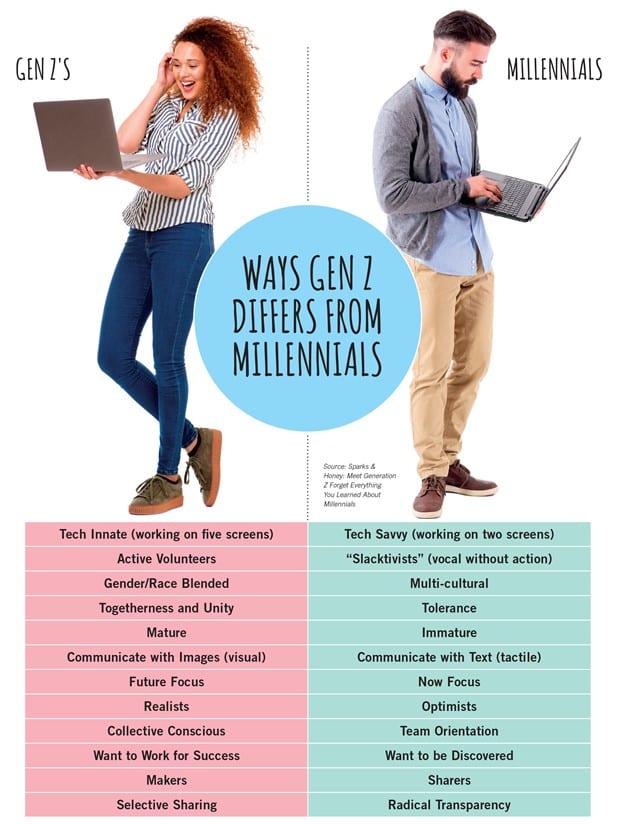Just as we get bored with complaining about the younger generation, here comes a new one to stress over. The generation of young people now entering college and the workforce are not just Millennials on steroids. They are another new and distinct group with a unique way of thinking, problem-solving and communicating.
Whenever a new generation begins to emerge, pundits are quick to jockey for naming rights. Those born between 1995 and 2015 have been called iGen, Gen Tech, Gen Wii, Net Gen, Homeland Generation, Post Millennials, Digital Natives and Plurals. But the name that looks like it’s going to stick is Generation Z or Gen Z.

It’s estimated that Gen Z will comprise 40 percent of U.S. consumers by 2020. This is the fastest-growing generation in both the workplace and the marketplace. This is why you’d better start paying attention now.
These young people have had a screen in their hands since they were toddlers. The innovations that members of older generations see as new technology have always been a part of Gen Z’s lives. For example:
- 2001 brought forth iTunes, the iPod and Wikipedia. Music and encyclopedias have always been digital for Gen Z.
- 2002 was the premiere of American Idol. To this group, reality TV is how stars and even presidents have made impressions and gained popularity.
- 2004 was the founding year for Facebook. For them, social media has always been how people stay in touch.
- 2007 brought the introduction of the iPhone but to Gen Z, people have always been using FaceTime, playing games, watching movies, listening to music and getting immediate answers to questions from handheld devices.
This post 9-11 generation has never known our country when it’s not fighting a war. Mass shootings have been their reality. Active shooter drills are part of their school days. They have always shopped online. And for them, Googling information to self-educate is second nature.
Each generation has its defining moments—those events that affect everyone at the same time and at the same stage of their development. For Gen Z, they saw their parents deal with foreclosures, job losses and economic cutbacks during the Great Recession of 2008. Student loan debt has made college less attainable. They grew up while President Obama was in office, so diversity at the highest level of leadership is normal to them. Marriage equality has been part of the national discussion and same-sex marriage has been legal for almost their whole lives. Likewise, they have seen marijuana become legal for medical use in 33 states and for recreational use in 10 states. They’ve seen 20-year-olds become billionaires and some of their peers become YouTube millionaires. The youngest members may even have been parented by Millennials whom they consider “old.”
Gen Z is the most diverse generation ever and they are sensitive to diversity. They like it. They value it. To them, it’s not about political correctness. They genuinely feel it is important to not offend other cultures. They sincerely like being surrounded by people who are different from themselves and want to learn more about other cultures. Most do not see diversity or notice it unless that diversity is absent. They are offended by offensive people.
Their parents are primarily Gen Xers and Millennials whose parenting styles may clash with those of the Baby Boomer parents who preceded them. The parents of Gen Z’s may have raised them with more of a you-figure-it-out approach than a you-need-to-succeed-and-do-it-right attitude that was likely taught by Baby Boomer parents.
Boomer parents tend to give their children what they need to be successful. Gen X and Millennial parents are more of the teach-a-man-to-fish variety and strive to teach children how to be successful on their own. Boomer parents are aspirational by telling their children that they can do anything. Gen X and Millennial parents are more realistic by encouraging children to do what they are good at and love doing.
There are several ways Gen Z differs from Millennials and these differences will surface in the workplace. You must be cognizant of these differences if you want to employ the best of them and sell to the rest of them.
First, technology is innate to them—there is nothing new about it. Technology is only new to those of us who remember the way it was before the technology was invented. If you don’t understand technology, you will appear lazy, because in their eyes, everything you need to know is right there for you to learn. So, the solution is to Google it, YouTube it, learn it. While you may have just gotten used to texting your Millennial customers, it’s time to up your game using FaceTime, Skype or other virtual live presentation tools.
GenZ’s are eager to build a better planet, a stronger community and a more peaceful world. It’s time for you to show your company’s purpose and how it aligns with those values. Make sure you’re only presenting products made and used responsibly, and those that have potential for good. Seventy-one percent of Gen Z say they buy brands that make them feel good about themselves.
This generation is well educated and are advocates of knowledge sharing. Be generous in sharing your expertise but do so in formats they relate to, like videos. A larger percentage of this generation will graduate from college than any previous generation. With their innate technology skills, they know how to research and self-educate. They embrace social learning environments and sharing and collaborating with peers. They are also impatient with a priority on speed.
Gen Z is already making a difference. Survivors from the Parkland school shooting immediately took to the streets and addressed the media to advocate for gun law reform. Those who are 18 and older turned out and voted in the mid-term elections last fall. The majority are socially liberal, fiscally conservative and vote their beliefs not for a party.
––––––––––––––––––––––––––––––––––––––––––––––––––––––––––––––––––––––

––––––––––––––––––––––––––––––––––––––––––––––––––––––––––––––––––––––
How To Communicate With Gen Z
Fully embrace mobile communication—your website and emails should be designed for mobile first. Members of Gen Z are less likely to be reading, listening or communicating with you on a laptop or desktop. Reach them through social media and mobile.
Whether you have Gen Z members on your team or they are your clients, be authentic. Just be yourself. They love real and hate put-on. Listen for understanding with respect for their point of view and that high-priced education they earned. Ask them for input and make them part of the process. Be a collaborator not a salesperson. Know your core values and share them. Be upfront about what you stand for.
Give them lots of options to express themselves on the items they are co-creating with you. Take that mindset as their co-creator and let them have every customization option to make it their own expression of the brand.
Keep in mind that most Gen Z’s watch YouTube on a daily basis. There are stars in that media that you may have never heard of who are making millions of dollars a year influencing this generation. If Gen Z is a big part of your audience, you need to start learning who those stars are and why they have appeal. Forty percent of Gen Z’s say they prefer to interact with their favorite brands on YouTube rather than on any other platform.
As you create the mobile online content for this generation remember that your content must include reviews and testimonials, photos, videos, blogs and vlogs (video blogs). To become a more visual and video savvy marketer you may want to take a course or self-educate using Google and YouTube. You should consider hiring someone who’s good at it and passionate about communicating to this generation.
Your marketing to Gen Z clients should focus on benefits and the results that your products and services provide using success stories. Learn to present yourself as a category or niche specialist—the expert—who can connect the dots for them. Explain how they can implement processes that will make them successful marketers using promotional products.
Create a customer experience worth talking about. If you do, they will talk about you and remain loyal to you. If you don’t, they’ll look for a partner who does create a share-worthy experience.
There are a lot of things to love about this new generation. They’re bright, they’re responsible (fewest smokers, drinkers and drug users of any generation), they’re educated, and they want to make the world a better place. Help them do it.
––––––––––––––––––––––––––––––––––––––––––––––––––––––––––––––––––––––
What’s Important To Gen Z’s?

Account Coordinator, Grapevine Designs, Lenexa, Kansas
How important are a company’s values when choosing where to work or who to buy from?
Very important—especially when choosing where to work. In my short six months in the promo industry, I’ve learned and been trained to always say “yes,” even when we should probably say “no.” But we always try to find a solution for all our clients and get them something they love in time for their events. In addition to being trained by people who have been in the business for 20-plus years and have an answer to every problem, we give back to our community. We have a garage sale every year that supports Red Bag in Kansas City and we work closely with the Kansas City Humane Society. These definitely attracted me to Grapevine Designs during the interview process.
Companies that advertise how they give back are always a step ahead in my mind. I try to keep these vendors top of mind while sourcing because the benefits from giving them orders support a larger cause. I also find myself using vendors that I know are responsive and great communicators because I value that. I like to know what is going on with my orders so being able to send a quick email or give someone a call to check on things goes a long way for me.
How do you prefer to communicate with clients? How do you prefer vendors to communicate with you?
Although quick email responses are usually the most convenient in our fast-paced industry, I think face-to-face interaction always makes for the most rewarding projects, especially with our clients. I like bringing our clients in, so we can get a really good understanding of an event or gift they want to see through before sourcing products. I also find the clients that continuously use us are the ones we learn the most about. So, if we can get them in the door or even on the phone, they are more likely to develop a relationship with us and use us again.
It’s always the vendors who make themselves known to Grapevine that I find myself reaching out to most frequently. If I can put a face to a business card, I’m much more likely to use their line when I’m in a jam or sourcing products. I find communication in this industry to be very important. It’s necessary to know who you’re working with, especially when trying to handle the quick turnaround times we are always up against.
What gives you the most satisfaction in your work?
Finding solutions for clients who just have a price point and a quantity but no idea what they want. It’s rewarding to come up with a product that exceeds their expectations and makes for a great event or employee gift. Also, just having a product that goes over well—something that the client loves, we love and feel good about, and then being able to support a vendor we love. It’s always the goal to make an order a win for everyone.
––––––––––––––––––––––––––––––––––––––––––––––––––––––––––––––––––––––

Communications Specialist, Creative Studio Promotions, Grand Rapids, Michigan
How important are a company’s values when choosing where to work or who to buy from?
It truly matters to me. In business today, you have two types of companies: the ones who value relationships more than dollar signs; and the ones who value dollar signs more than employees, clients and strategic partnerships. The reason “values” influence the decisions I make in choosing where to work is that I want to feel that I can back the company’s decisions they make in business along with the ones they make “relationally.” When my company has values that align with mine, it allows me to believe in their mission.
Choosing who to buy from is a little bit different for me. I would say that most of the time, I don’t pay attention to a company’s values when deciding whether or not I should purchase their goods. This is not to say that I am a believer in companies that are corrupt but when I purchase something I am looking at the product and asking, “What can this product do for me?” or “How can this service benefit me?” We see news stories of brands throwing themselves into a black hole—United Airlines dragging a passenger off of the plane, Nike hiring Colin Kaepernick as a spokesperson, or even Facebook struggling to keep information private. After graduating with a bachelor’s degree in public relations and strategic communication, I know that when these crises hit, it is monumental in how the company responds—especially to the Gen Z age group. The way the company responds shows exactly what their brand truly is, and the values that surround them. Their response and actions will affect the perspective that people have of the brand, and in turn influence their buying decision.
How do you prefer to communicate with your clients? How do you prefer your vendors communicate with you?
Personally, I prefer to either speak with someone face-to-face, or over the phone. Email is great for some situations and for keeping a paper trail, but I prefer to talk to someone where I can hear what they are saying and the “emotions” behind their words. After these conversations, I like to follow up with an email regarding what we covered. [With vendors] I prefer email because of the “paper trail.” I would say nine times out of 10, if you are discussing something with a vendor over the phone, there will be details that will simply be forgotten if not written down.
What gives you the most satisfaction in your work?
Making sure that clients are happy with the service and goods we provide. I value relationships more than anything in business and my personal life. Yes, it is nice closing a deal, but building relationships will take you a lot farther in business than a dollar ever will.
––––––––––––––––––––––––––––––––––––––––––––––––––––––––––––––––––––––

Account Executive, Glessner Promo LLC, Belmont, Michigan
How important are a company’s values when choosing where to work or who to buy from?
They’re very important because if you have similar values you know you’ll get along and work well together—good relationships are key in this industry.
How do you prefer to communicate with your clients? How do you prefer your vendors communicate with you?
I prefer email when it’s basic communication, but a phone call is always the best option when needing a lot of information.
What gives you the most satisfaction in your work?
I love seeing the end product come to life and happy clients. It’s always satisfying to assist employees to “better” their business.
––––––––––––––––––––––––––––––––––––––––––––––––––––––––––––––––––––––

Promotional Products Specialist, Second Step Advertising, Wyandotte, Michigan
How important are a company’s values when choosing where to work or who to buy from?
Extremely important. If a company has a history of breaking up employee attempts to unionize or has a history of mistreating their employees, I will not spend my money with them. Amazon and Walmart are both large retailers I don’t shop with anymore because of this. There’s also a number of local bars/restaurants I no longer patronize because of how their employees are treated. I somewhat dislike traditional corporate culture at large companies and avoid taking jobs at them in favor of smaller businesses with more flexible rules/dress code—even if it means having to work a second job waiting tables at night.
How do you prefer to communicate with your clients? How do you prefer your vendors communicate with you?
I prefer Facebook Messenger over everything for communicating with clients because it’s easy to send photos/video. I don’t have to worry about if I have a correct phone number, it feels more personal and I can just log out of the app if I don’t want to be reachable for a little while for whatever reason. With vendors, phone calls with email follow-ups are best since I have a way to remember their name, contact information and what we talked about should I need to follow up about something. And we can get the important information quickly (and with less of a risk of miscommunication) over the phone.
What gives you the most satisfaction in your work?
Successfully completing an artwork job. I have no graphic design background and had to hit the ground running when I started working at Second Step. Everything I’ve learned has been through Google, YouTube and pressing buttons in the program randomly in different order until it does what I want it to do. Artwork is hands down the most difficult aspect of my job, and I will admit to doing a little happy dance in my chair when I’m able to get it right.
––––––––––––––––––––––––––––––––––––––––––––––––––––––––––––––––––––––
Paul A. Kiewiet, MAS+, CIP, CPP, a former distributor, is the executive director of the Michigan Promotional Products Association and an industry coach and consultant. He has been studying the effects of generational change on the promotional products industry since 2008 and has presented numerous programs on generational marketing. He has also coached professionals in every generation and works to create better understanding and collaboration among them. Kiewiet was inducted into the PPAI Hall of Fame in 2015 and is a former PPAI chair of the board.


